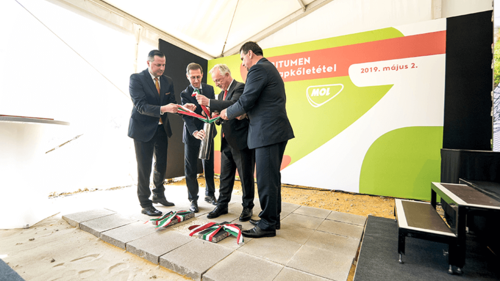
A new rubber bitumen plant, with an investment of approximately 9.3 million Euro, is expected to produce 20,000 tons per year in 2020. The rubber bitumen can be used to build more durable asphalt roads with lower load capacity. The plant will use 3,000 tons of rubber scrap annually, contributing to the recycling of about half a million used tires. The new plant is being built in response to increased demand and will contribute to the efficient operation of the Zala Refinery, maintaining refinery jobs for around 100 workers.
The rubber bitumen plant with an investment of approx. 9,3 million Euro is expected to produce 20.000 tons per year in 2020. MOL rubber-bitumen can be used to build more asphalt roads with lower load capacity and more durability. The durability is illustrated by the fact that there is no pothole on the roads made with rubber bitumen, although the oldest experimental roadway is 15 years old.
The new plant uses 3,000 tons of rubber scrap annually to produce rubber bitumen, which contributes to the recycling of about half a million used tires. This corresponds to 8-10 percent of the annual domestic tire waste.
In the Zala Refinery, a 5,000-ton capacity rubber bitumen plant was launched in 2012, and the new plant will be built in response to increased demand. The new plant contributes to the efficient operation of the Zala Refinery and to the maintenance of refinery jobs currently employing some 100 workers.